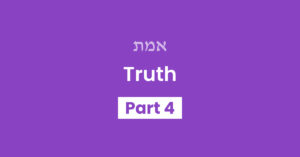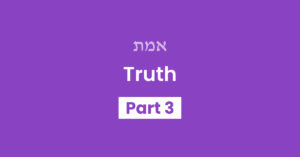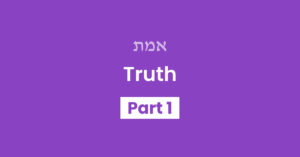Last week, we began learning about the middah of Emes (truth). We explained how Hashem cannot tolerate being in the presence of people who lie, and how saying inaccurate or untrue words can cause harm to other people. We also explained that if a person is careful to speak only the truth, he will be seen as a trustworthy person, because other people know they can rely on his words.
But Emes is not just about how we speak to other people. Chazal teach that there is an important middah called “Doveir Emes Bilvavo” – speaking the truth in your heart. As much as it’s important to speak the truth to others, it is equally important to speak the truth to ourselves.
Chazal teach that there is an important middah called “Doveir Emes Bilvavo” – speaking the truth in your heart.
What is this middah all about, and what does it mean?
Speaking the Truth to Yourself
In defining the middah of “Doveir Emes Bilvavo,” the Gemara1 offers the example of Rav Safra, who was once in the middle of reciting Krias Shema when someone came along to purchase one of his goods. The buyer offered him a certain amount of money, but Rav Safra didn’t respond. Thinking that Rav Safra was unsatisfied with his offer, the man offered to pay a higher price. When Rav Safra finally finished saying Shema, he told the man that he would sell the item for the lower price, because when he had heard the man’s initial offer, he had already decided in his heart that he would sell it at that price.
This is the middah of “Doveir Emes Bilvavo” – when you make a decision in your heart, you stick to your decision.
This is the middah of “Doveir Emes Bilvavo” – when you make a decision in your heart, you stick to your decision.
This same quality was exemplified by Avraham Avinu, after Akeidas Yitzchak. When Hashem commanded Avraham to bring up Yitzchak as a korban, Avraham decided in his heart that he would follow Hashem’s command, no matter what. With tears in his eyes, Avraham lifted the knife and prepared to slaughter his only son. Suddenly, an angel called out from the Heavens: “Avraham, Avraham! Don’t do anything to your son! Because now I know that you fear Hashem [since you passed this test].”2
When Avraham heard this, on the one hand, he was deeply relieved. But on the other hand, Avraham was worried. If he would just walk away without doing anything at all, he would be letting go of his committment to sacrifice Yitzchak for the sake of Hashem. If he would just walk away, he would be missing the opportunity to follow through on the intentions of his heart, which would be a lack of the middah of “Dover Emes Bilvavo.”
So what did Avraham do? He slaughtered a ram as a korban, instead of Yitzchak. Avraham did this because he wanted so badly to fulfill the middah of “Doveir Emes Bilvavo” – sticking to the resolutions of one’s heart.3
Why So Important?
Sticking to your resolutions is such an important middah that it is counted as one of the 11 middos that encompass the entire Torah.4 Furthermore the Ibn Ezra writes5 that this middah is “Kol Aa’adam” – it defines an entire person!
Furthermore the Ibn Ezra writes that this middah is “Kol Aa’adam” – it defines an entire person!
Why is it so important to follow through with the intentions of your heart?
The Sifsei Chaim6 explains that “Doveir Emes Bilvavo” is so fundamental because the only way we can grow in our service of Hashem is if we train ourselves to follow through with the decisions of our hearts.
The only way we can grow in our service of Hashem is if we train ourselves to follow through with the decisions of our hearts.
Imagine that Sarah is in the process of becoming frum, and she is just starting to keep kosher. One day, Sarah learns that it’s forbidden to eat meat and milk together. She is so inspired by the class that she says to herself: “You know what? From now on, I am never going to eat meat and milk together, ever again!”
Later that day, Sarah passes by McDonald’s and smells the delicious aroma wafting out of its doors. “Mmmm… that smells so good!” she thinks to herself. “I’m really in the mood for a good cheeseburger!”
But then she stops herself. “Wait a minute,” she thinks. “Didn’t I just decide this morning that I would never eat meat and milk together again?” Sarah wrestles with herself internally. “Oh, who cares what I thought earlier today. What are my thoughts anyway? They are just like fleeting thoughts in the air. Like nothing. I don’t have to stick to what I thought earlier today.” And she goes inside and orders a cheeseburger.
In order to grow in life, it is essential that we train ourselves to stick to our resolutions.
In order to grow in life, it is essential that we train ourselves to stick to our resolutions.
Building up this sense of trust and reliability with ourselves is especially important due to the fact that we naturally go through cycles of inspiration and discouragement throughout our lives.7 As long as we are feeling inspired, we can see the truth clearly and we are inspired to grow. But when the inspiration wanes, it’s hard to keep it up.
For example, maybe you once heard a series of classes about the importance of tefillah, and you were so inspired that you decided you will make time to daven Mincha every single day. For several months, you stick to your committment. But then your life gets busier, and the inspiration fades, and slowly the days you remember to say Mincha are getting few and far between. “What happened to my Mincha?” you wonder one day. “Oh, it was just a passing phase, I guess. I must have been inspired for a while. But just because I was inspired then, doesn’t mean I have to keep up with it now.”
Building up Trust With Ourselves
Just as speaking the truth to other people helps you earn their trust, so too, the more we accept our own thoughts and resolutions as true and lasting, the more we will build up trust of ourselves. Even time that we follow through with one of our commitments, it reinforces within ourselves the thought “Yes! I am able to make commitments and stick to them. I am a strong and reliable person. I am loyal and reliable to myself.”
“Yes! I am able to make commitments and stick to them. I am a strong and reliable person. I am loyal and reliable to myself.”
Without this middah of “Doveir Emes Bilvavo,” a person might take a few steps forward to grow in his mitzvah observance, but then as soon as he loses his inspiration, he risks losing all of the levels he had ever previously achieved!
This week, let’s practice the middah of “Doveir Emes Bilvavo” by making small commitments to ourselves… and then training ourselves to follow through.
Sources: [1] Makkos 24a with Rashi; [2] Bereishis 22; [3] Sifsei Chaim Middos Vol. 1 pg 36 and Sifsei Chaim Bereishis pg. 171; [4] Makkos 24a; [5] Ibn Ezra on Tehillim 15:20; [6] Sifsei Chaim Middos Vol. 1 pg. 38; [7] ibid. pg. 39;
Your Challenge
Once a day, make a small committment to yourself, and then stick to it. (Say “bli neder” just in case!)
As you stick to your commitment, think: “I am doing this because I am loyal to myself. I stick to my resolutions.”
FOR EXAMPLE:
- I already ate 2 cookies and am not going to eat any more for the rest of today (bli neder).
- I wont check Facebook/Twitter for the next hour (bli neder).
- I am about to say Asher Yatzar. I am going to try to stand in 1 place while I say the bracha, and not walk around (bli neder).
- I will call my grandparents tonight just to say hello (bli neder).
Torah Questions
- “Emes” is included in a well-known list of middos in Shemos Chapter 34. What do we call this list of middos?
- How does Rashi define the middah of “Emes” there?
- What does Dovid HaMelech say about someone who “speaks truth in his heart” (Tehillim 15)?
- According to Pirkei Avos 1:18, the world stands on 3 things: Emes, ____, and ____? (Note: The answer in THIS Mishna is not Torah, Avodah, and Gemilus Chassadim)
- According to Rashi (Tehillim 85:11), what will happen when the Jewish people speak truth?
- Who said: “Blessed is Hashem, the G-d of Avraham, Who did not leave His kindness or His truth from my master”? (Bereishis 24)
Questions to Ponder
- The Gemara writes that Hashem’s signature is “Emes” (truth). What do you think it means that Hashem’s signature is truth? Why is Hashem’s Emes singled out any more than any one of His other amazing middos? How does Emes uniquely define Hashem?
- If your signature was just 1 word – a middah that you uniquely excelled in – which middah would it be?
- A passuk in Mishlei (23:23) writes: “Purchase Emes and do not sell it.” The Gemara (Brachos 5b) says that “Emes” here refers to the Torah. But why are we told to “purchase” the Torah? Aren’t we able to learn Torah for free?
- The Gemara writes that being “Modeh Al Ha’Emes” (admitting the truth) is one of the 7 qualities of a wise man. Why is it so important to admit the truth? If you had to pick 7 qualities that characterize a wise man, which 7 qualities would you choose?




